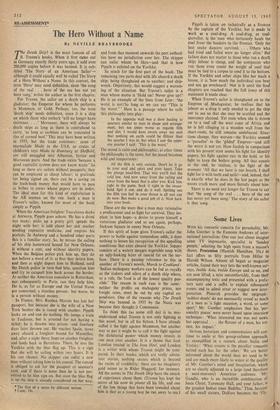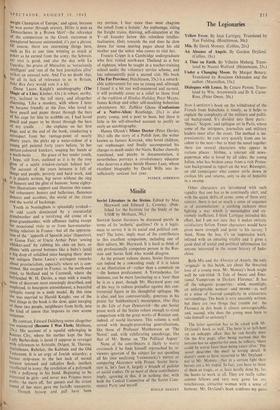Some Lives
WITH his romantic concern for personality, Mr. John Gunther is the Eamonn Andrews of inter- national journalism. One can just about imagine some TV impresario, specialist in 'Sunday people,' selecting the high spots from a season's shows. Procession (Hamish Hamilton, 35s.) in fact offers us fifty portraits from Hitler to Harold Wilson. Almost all began as magazine articles, found their way into the well-known sur- veys, Inside Asia, Inside Europe and so on, and arc now lifted, a mite uncomfortably, from their accompanying texts and presented with a prefa- tory note and a suffix to explain subsequent events and to admit error or suggest new inter- pretation. Plutarch provides the epigraph: `noblest deeds' do not necessarily reveal as much of a man as 'a light occasion, a word, or some sport.' Mr. Gunther emphasises that his 'per- sonality pieces' were never based upon interview technique: 'What interested me was not news, but appraisal . . . the flavour of a man, his tex- ture, his impact.'
Serious historians and commentators will con- tinue to smile at this gossip-column approach, as exemplified in a remark about Stalin and Trotsky: 'What counts is the peculiar romantic hatred each has for the other.' We are better informed about the world than we used to be and are much more likely to wince at the quality of Mr. Gunther's mind and imagination, which are so clearly adjusted to a large (and therefore a semi-moronic) American audience. `Mr. Gandhi, who is an incredible combination of
I
Jesus Christ, Tammany Hall, and your father, s the greatest Indian since Buddha.' Thus, because of his small stature, Dolfuss becomes the 'Fly- weight Champion of Europe,' and again, because he won power through oratory, Hitler is seen as 'Demosthenes in a Brown Shirt'--the relevance of the comparison to the Greek statesman is unexplored because unintended; it's just a phrase. Of course, there are interesting things here, such as Ike at one time winning as much at Poker as he earned from the army; the Schweit- zer visit is good, and also the day with La Guardia; the praise of Mussolini as 'voraciously intelligent' and 'one of the best journalists alive' strikes an unusual note. And I've no doubt that, for all its lack of relevance to us in Britain, Jake Box Jury would vote it a hit.
Dame Laura Knight's autobiography (The Magic of a Line; Kimber, 63s.) is robust, earthy, wry, inclined to the tall story, and altogether charming. 'Like a monkey, with whom I later on became friendly at the Zoo, who loved to have pencil and paper thrust through the bars of his cage for him to scribble on, I had loved Pencil and paper to be thrust through the bars of my cradle . . .' she explains on her first Page, and at the end of the book, conducting a retrospect from her vantage-point of nearly ninety years, she picks up a water-colour of a Young girl painted forty years before, 'in her apricot-coloured knickers, soaping her hands at a wash-baSin . . . the grace of her tender youth,
hope, still lives, outlined as it is by the rosy glow of a sunlit window-curtain behind her.' The account of the years between is full of things and people, poverty and hard work, and it is plainly written, brit never without the ring of honesty and the glint of humour. Some eighty- two illustrations support and illumine this essen- tial robustness: boxers and ballerinas, flamenco dancers and acrobats, the world of the circus and the world of backstage.
Youth in Nottingham is splendidly evoked— an odd youth dominated by a resourceful grandmother and a terrifying old crone of a great-grandmother, with affluence fading except for occasional visits to or from lace-manufac- turing relatives in France—but all the apprecia- tion of the "apporth of Spanish juice' (liquorice), or Goose Fair, or Uncle Arthur Peter `sowing Whisker-seed' by rubbing his chin on hers, or Plums 'with curved bottoms like a baby's [and] a big drop of solidified juice hanging there' does not mitigate Dame Laura's astringent remarks about provincialism, especially where art is con- cerned. She escaped to France, to the north-east coast, to Holland and to Cornwall, where she befriended W. H. Davies, a man with a touchy sense of deCorum most amusingly described, and employed, to bourgeois astonishment, a beautiful epileptic tramp as a nude model. By this time she was married to Harold Knight; one of the best things in the book is the slow, quiet merging of these two people, neighbours from birth, into the kind of union that imposes its own serene reticence.
By contrast, Edward Dahlberg seems altogether too mannered (Because I Was Flesh; Methuen, 25s.). His account of a squalid upbringing in Kansas City, where his mother kept the Star Lady Barbershop, is laced (I suppose in revenge) with references to Aristotle, Origen, St. Theresa, Antisthenes, Rabelais, the Kabbala and the Old Testament. It is an orgy of Jewish wizardry; a bazaar strip-tease to the last inch of unreal because tattooed and talkative flesh; intellect recollected in irony; the revelation of a polymath with a pollywog in his hand. Beginning to be interested in girls—and never was Priapus more Prolix--he starts off, `her gussets and the orient sound of her stays gave me furiobs transports.
• • . Though hyssop and gall have been my portion, I fear more than most chagrins the rebuff from a female.' An orphanage, riding the freight trains, thieving, self-education at the Y—all founder below this relentless intellec- tualisation. Only towards the end does he slow down for some moving pages about his old mother and the suitor who comes to visit her,
Francis Cripps is a Cambridge undergraduate who first visited north-east Thailand as a boy of eighteen, when he taught in a teacher-training school under the voluntary service scheme, and has subsequently paid a second visit. His book (The Far Province; Hutchinson, 35s.) is a remark- able achievement for one so young and, although found it a bit too well-mannered and earnest, it will probably come as a relief to those tired of the tradition of Hindoo Holiday, Peter Mayne, James Kirkup and other self-mocking bohemian adventurers. Mr. Zulfikar Ghose (Confessions of a Native-Alien; Routledge, 21s.) is also pretty young, and a poet to boot, but there is little in his self-absorbed account to justify so early an autobiography.
Hanna Olczak's Mister Doctor (Peter Davies, 30s.) tells the story of a Polish Jew, the writer known as Jamusz Korczak, who loved children, ran orphanages and finally accompanied his charges to death under the Nazis. Rather clumsily translated, and patchy in documentation, it nevertheless portrays a revolutionary educator who deserves a place beside Homer Lane, whose excellent biography by David Wills was in- sufficiently noticed last year.
PATRICK ANDERSON































 Previous page
Previous page